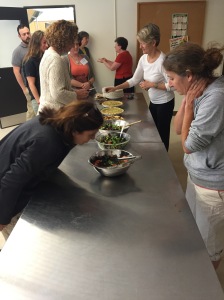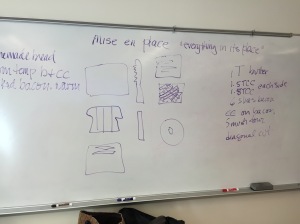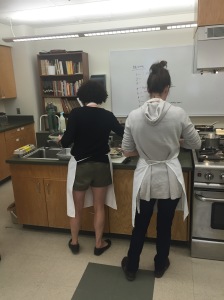Rachel Black
President, Society for the Anthropology of Food and Nutrition
Connecticut College
Last week, I had the opportunity to attend the John Dewey Kitchen Institute at the University of Vermont. The goal of this three-day workshop was to “emphasize experiential education, of course in teaching about food but also as an important pedagogical approach for teaching any subject.” As a long-time believer and practitioner of hands-on learning, I was eager to hone skills and think more about how to create opportunities for experiential learning in my anthropology of food classes.
Getting our senses warmed up straight away, we passed around, smelled and identified plates of herbs and spices. The instructors then asked the 12 participants to think of a life experience we could relate to a specific herb or spice. These flavorful narratives were a great way to get to know each other. At this point, we also began to discuss John Dewey’s philosophy of education, which would provide the underpinnings for our activities and reflections over the next few days. Instructors Lisa Heldke and Cynthia Belliveau gave the class a list of 12 Deweyan tenets. These ranged from “Education is experience” to “Enquiry is value-laden”. The tenets were an attempt to answer the questions: “What does it mean to learn, and how should that understanding inform our teaching and learning in the food studies classroom?” and “What is the world like, how does inquiry work, and how should these inform our teaching/learning?”

After a brief kitchen orientation, we engaged in our first hands-on activity–knife skills. We were instructed how to chop onions and carrots and then given knives, cutting boards and ingredients. What became quickly apparent was the amount of focus the activity took, whether you were a professional chef or someone who eats out for most meals. This is when I began to understand that the goal here was not learning to cook but rather cooking to learn. It was the reflection on the embodiment of skill and the presence of the mind in the body that resonated with me in this first lab. This activity was focused on the fifth tenet “play”: “Far from being trivial, play is “interested absorption in activity for the sake of activity itself.”

The next day we discussed the concept of mise en place and how this type of kitchen organization task might be used to get students to think about planning and organization in new ways. As we drew out our mise en place, I began to think about the spatial relationships between sensory experiences. That was a new dimension for me. I never really gave much thought to where I put my ingredients and why. After some reflection, we began to prepare lunch. This was an activity that not only fed us but taught us to think about divisions of labor and timing in the kitchen. This activity could be seen as an exercise in “education as a practice of democracy”. Having to organize ourselves and work together put this tenet in to action. I began to think about all the applications for such skills beyond the kitchen.
We did a number of tastings in the course, from the herbs on the first day to local craft beers on the last day. We were not provided with tasting sheets but we did discuss the different ways in which we might structure tastings in order to achieve specific learning outcomes. Here we explored the tenet “theory is practice” and how “when theory and practice operate together effectively, learners act reflectively and inquiringly, with a sense of purpose and for the sake of learning.”
On the last day, we were given a market basket and asked to cook lunch in teams. We were told that our dish had to embody one of the Dewey tenets. This was a challenging culinary and organizational task. My partner and I focused on “chance and change.” Although we ultimately produced some tasty poached eggs on toast with a romesco sauce, we felt that the experience was mediated by this tenet: we did not know what we would get for ingredients, what would happen in the cooking process, and we felt the need to adapt to the unexpected.
As an anthropologist, I kept thinking about the ways I could introduce cultural diversity in to these exercises. While Dewey’s philosophy is second nature to most of us who do fieldwork, this workshop was an opportunity to bring the worlds of food studies and anthropology together. As I prepare my courses for the fall semester, I will be thinking of ways to bring experiential learning scenarios in to my anthropology of food courses.
